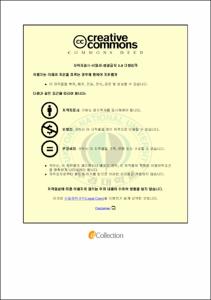또래칭찬 프로그램이 만 5세 유아의 자기 효능감 및 사회적 유능감에 미치는 효과
- Abstract
- Effects of Peer Praise Program on 5-year-old children's
Self-efficiency and Social Competence
An Ju Young
Early Childhood Education Major
Graduate School Education
Pukyong National University
Abstract
Much advanced research has already proven that peer praise has positive effects on children's self-efficiency and social competence within personal and peer relations as a practical and educational way at children education institutes. Development of peer program subject to children and the verification of the effects of the program, nevertheless, haven't been performed yet. For this reason, this study aims to investigate the positive effects of peer praise program on 5-year-children's self-efficiency and social competence, after developing a peer praise program supposed to impact on children's emotion positively. Hypotheses according to aims of the study are as in the following.
First, peer praise program has positive effects on 5-year-old children's self-efficiency.
Second, peer praise program has positive effects on 5-year-old children's social competence.
To verify those hypotheses, 33 5-year-old children attending W kindergarten in Haundaegu, Busan were selected as experimental group and comparative group. 17 children who have odd number on the attendance list were classified as a experimental group while 16 children with even number were selected as a comparative group. Children's ages of the experimental group were 61.7 months on average and it was 62.5months for the comparative group. To figure out homogeneity between the two groups, pre-test was conducted and children of the experimental group received peer praise program as 12 sessions for four weeks. The peer praise program was composed of language, non-verbal communication, reward compliment and Nuri course as large and small programs. After the completion of the program, both groups conducted post-test respectively.
The measurements of the study were Jeon In Ok(1996)'s self-efficiency test for children Lee Hye Won(2005)'s social competence standard for children conducted by teachers. When it comes to social competence standard, one item related to emotional adjustment was unsuitable to investigate children's social competence during face validity and the item was excluded.
SPSSWIN(ver. 18.0) was used for date processing and mean-difference verification (t-Test) of pre-scores was carried out for subdomains of self-efficiency and social competence between the two groups. As a result, there's homogeneity between two groups and mean-difference verification was performed between the two groups.
There were significant score differences between two groups according to the peer praise program. The program had positive effects on social self-efficiency, and social emotional self-efficiency as a subdomain of self-efficiency. Although there was no significant result for cognitive self-efficiency, the experiment group scored higher than the comparative group, which proved there were positive effects.
In the light of social competence, there were significant score differences between two groups for overall social competence score and emotional adjustment, emotion, peer relationship skills and understanding social norms. The result shows children should be encouraged to internalize their competency social through various experiences at children education institutes.
Programs on the study were classified as verbal and non-verbal reward compliment. The programs are meaningful that they were invented and applied for children, especially 5-year-old children. They can be utilized as an educational way to improve children's self-efficiency and social competence.
Conclusions based on the results and discussions are as in the following.
First, the program of the study has positive effects on 5-year-old children's self-efficiency.
Second, the program of the study has positive effects on 5-year-old children's social competence.
There are suggestions to overcome the limits of the study for further studies. First, the researcher had limited time to observe the changes of the children's behaviors and attitudes unlike their teachers as a experimenter of the study in real time. Second, the results of the study might be unable to be generalized as the researcher rated the children's self-efficiency due to limited time their teachers had. Third, since the study was based on 5-year-old children, the results of the study might be not able to be generalized. Fourth, further studies should focus on contents of Nuri course. If it can be integrated with daily topics of children education institutes, the positive effects will increase. Fifth, peer praise programs can be suggested as a way to improve children's positive personalities.
- Issued Date
- 2014
- Awarded Date
- 2014. 2
- Type
- Dissertation
- Publisher
- 부경대학교
- Affiliation
- 교육대학원
- Department
- 교육대학원 유아교육전공
- Advisor
- 이희영
- Table Of Contents
- Ⅰ. 서론 1
1. 연구의 필요성 및 목적 1
2. 연구가설 6
3. 용어의 정의 7
4. 연구의 제한점 8
Ⅱ. 이론적 배경 9
1. 자기 효능감 9
2. 사회적 유능감 15
3. 또래칭찬 22
4. 또래칭찬과 자기 효능감 및 사회적 유능감의 관계 27
Ⅲ. 연구방법 32
1. 연구설계 32
2. 연구대상 32
3. 측정도구 33
4. 또래칭찬 프로그램 35
5. 연구절차 44
6. 자료분석 46
Ⅳ. 연구결과 및 해석 47
1. 또래칭찬 프로그램이 유아의 자기 효능감에 미치는 효과 47
2. 또래칭찬 프로그램이 유아의 사회적 유능감에 미치는 효과 50
Ⅴ. 논의 및 결론 53
1. 논의 53
2. 결론 및 제언 57
참고문헌 59
부록 72
1. 유아의 자기 효능감 측정도구 72
2. 교사용 유아의 사회적 유능감 평가척도 75
3. 회기별 지도안 78
- Degree
- Master
- Files in This Item:
-
-
Download
 또래칭찬 프로그램이 만 5세 유아의 자기 효능감 및 사회적 유능감에 미치는 효과.pdf
기타 데이터 / 2.67 MB / Adobe PDF
또래칭찬 프로그램이 만 5세 유아의 자기 효능감 및 사회적 유능감에 미치는 효과.pdf
기타 데이터 / 2.67 MB / Adobe PDF
-
Items in Repository are protected by copyright, with all rights reserved, unless otherwise indicated.